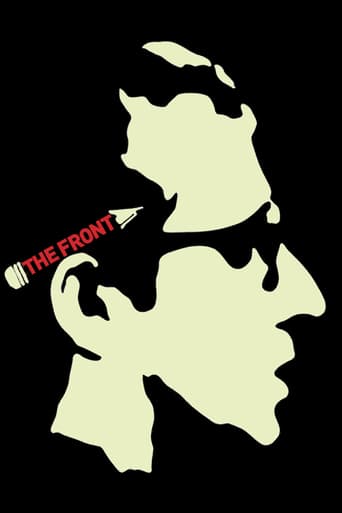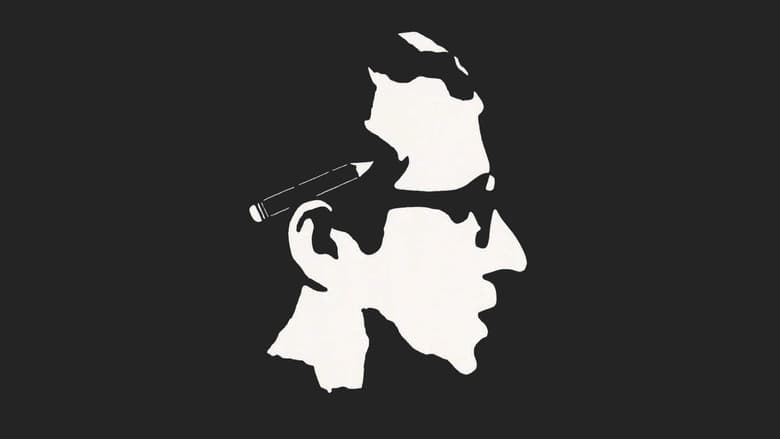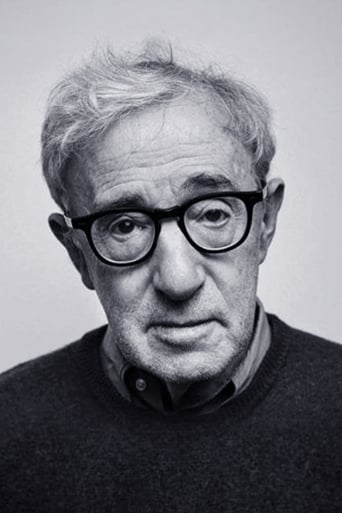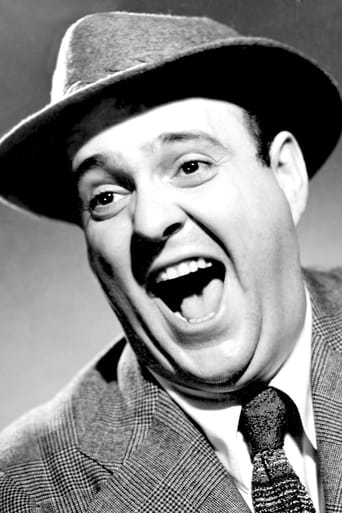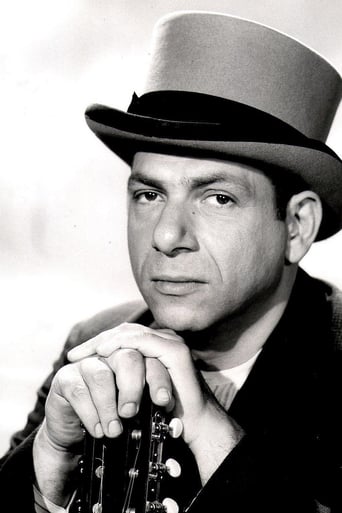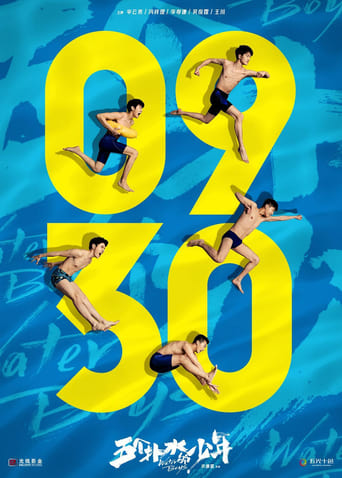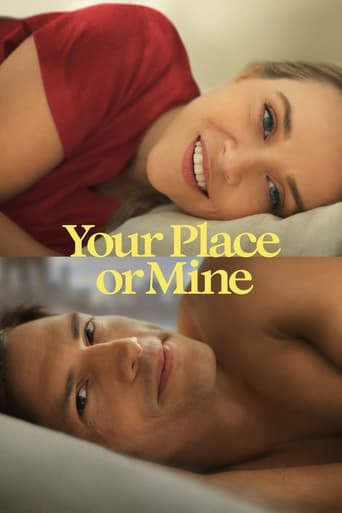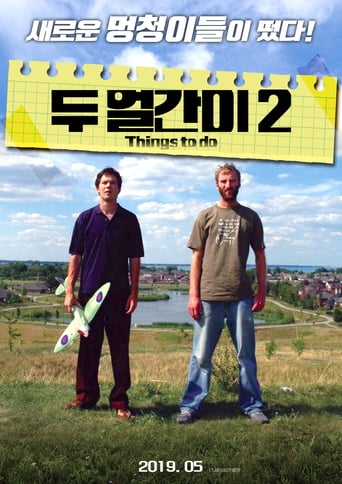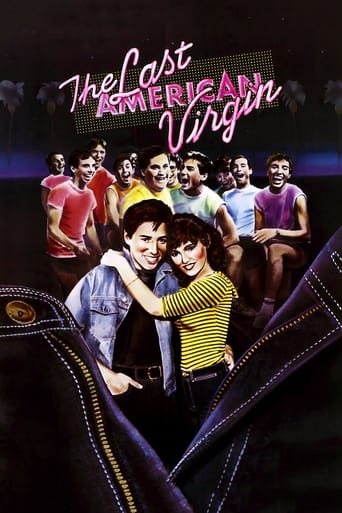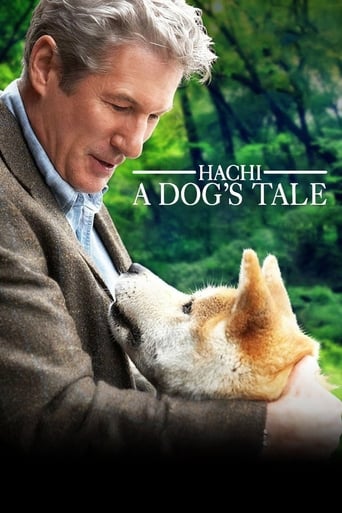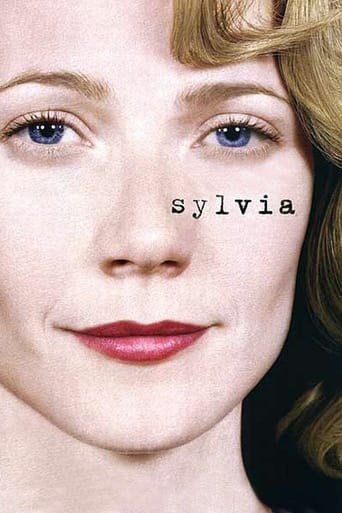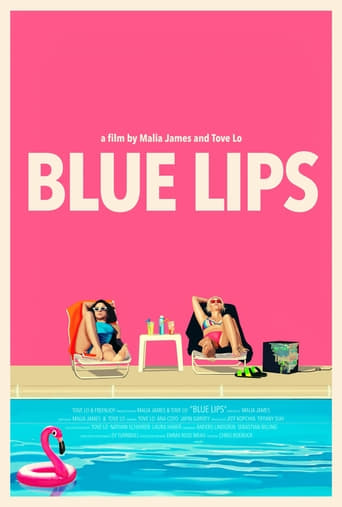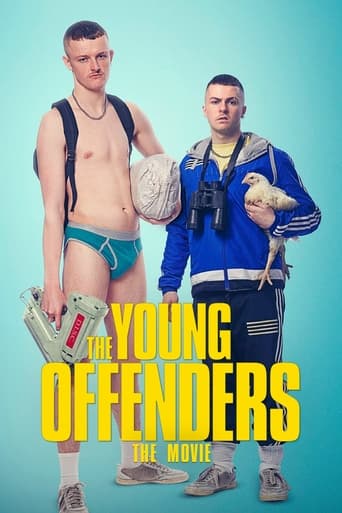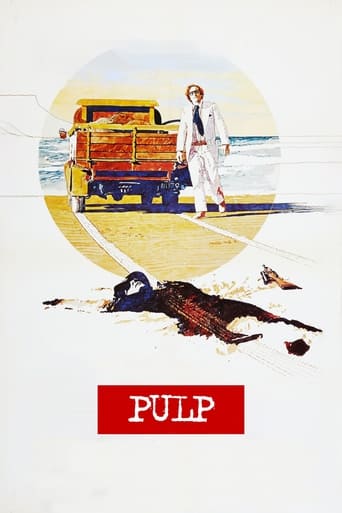The Front (1976)
A cashier poses as a writer for blacklisted talents to submit their work through, but the injustice around him pushes him to take a stand.
Watch Trailer
Cast
Similar titles
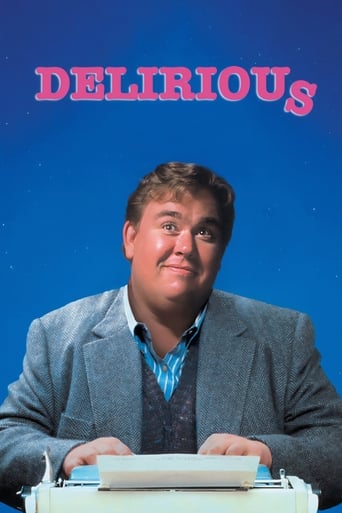
Reviews
Thanks for the memories!
Very interesting film. Was caught on the premise when seeing the trailer but unsure as to what the outcome would be for the showing. As it turns out, it was a very good film.
Blistering performances.
One of the film's great tricks is that, for a time, you think it will go down a rabbit hole of unrealistic glorification.
Review: Out of all of the Woody Allen movies that I have seen to date, this is the best acting that I have seen from him. There's none of those annoying one liners or the usual focus on a troubled relationships. Maybe that's because it wasn't written and directed by Woody Allen, which proves that he can put in a better performance when he isn't behind the camera. The movie is based around the time when communists were getting black listed in Hollywood which meant that people wasn't able to get there scripts read by studios. This is when Allen comes in, and works as the perfect cover for the out of work writers. Although this film was released in the 70's, it's still watchable and enjoyable for this day and age. Round-Up: I have finally found a straight laced Woody Allen movie which I didn't find annoying! It just happens to be one that he hasn't written or directed and he isn't constantly getting his leg over during the movie. I liked the performance from Zero Mostel, who starred in a lot of Gene Wilder movies like the Producers and I liked the fact that the director brought tension to the whole difficult situation. In all, this is a better side to Woody Allen's acting which wasn't as big as Manhattan or Annie Hall, but it is just as good.I recommend this movie to people who are into there dramas about a group of writers who get black listed from Hollywood during the communist period. 6/10
Martin Ritt, once blacklisted during the height of the Red Scare, directs "The Front". The plot? Woody Allen plays Howard Prince, a small-time bookie who has a blacklisted friend who once wrote for television. Seeking to make easy cash, Prince agrees to publish his buddy's scripts under his own, untainted name. When this scheme proves successful, Prince takes it upon himself to publish the scripts of countless other blacklisted writers. Much hilarity ensues.Though based on a very original and very interesting premise, "The Front" wastes most of its good ideas and trivialises an important period of history. The blacklist years weren't just a quirky little overreaction on the part of the United States, but a massive, bloody form of class warfare designed to eradicate any and all free thought and destroy any revolutionary or reformist movements that had the potential to impinge upon corporate profits. On one end of the spectrum, countless "soft" purges in the political and cultural fields were embarked upon. On the other end, the US government, CIA and (primarily) Britain would spend the next 90 years massacring left-wing movements, murdering democratically elected leaders and sponsoring coups against the heads of over 80 countries. These were not "quirky overreactions", but a clandestine war in which anything opposing Western capitalist interests was systematically destroyed. Often, whole political parties were removed by force or subversion, or factions and puppet dictators were armed to overthrow democratically elected political leaders, most of whom weren't "commies" but rather simply attempting to introduce reforms, egalitarian measures or nationalise resources. In the modern era, this all started with the massacres committed against the Indonesian independent movements (1898-1914 – over half a million civilian deaths). From 1903-1936, Panama, Haiti and Nicaragua became bloody, defacto US Colonial holdings, whilst the US began supporting the White Rebels and the Tsars/aristocracy during the Russian Civil War. In the 1940s, right-wing dictators were backed in the Philippines, Peru, Ukraine, Syria (Colonel Al-Zaim's dictatorship), Albania, South Korea, and Italy (the CIA bought every Italian election from 1948-76), with local democratic elections subverted and left-wing politicians/movements murdered. President Lyndon Johnson's "F**k your parliament and your constitution", uttered to Greek ambassadors, sums up US policy during this period. Coups in Greece were sponsored in 1949, 1967 and 1973, with US backed dictatorships running for a ten year period. Meanwhile, US sponsorship of the Kai-Shek family in China leads to some 18 million deaths. In the 1950s, the nationalising of resources leads to similar coups in Iran. Same story in Guatemala, Albania, Poland, Lebanon, Jordan, Guyana, Hungary, Oman, Portugal, Haiti, Taiwan, Cuba (the CIA overthrows Socorras and puts in place Batista), Costa Rica, Jamaica, Bolivia, Dominican Republic and Ecuador. In Pakistan, the US supports General Yahya and his genocide. In 1971 it puts the genocidal Idi Amin in power of Uganda. In Puerto Rico, independence movements were violently crushed. From 1950 to 75, the US supports fascist dictators in Spain. In Laos, one coup a year was instigated by the CIA for almost 2 decades. In 1961, the first democratically elected leader of Congo was assassinated by the CIA. Similar coups were spearheaded in Brazil, Honduras, Fiji, Columbia, the Balkans, Romania, Liberia, Turkey, Dominican Reublic, Uruguay, Bolivia and Indonesia. In Vietnam, the 1952 Saigon bombings were faked and blamed on "terrorist communists" to justify US intervention. About 5 million south east Asians would die in that "conflict", 40,000 to the CIA's assassination programme, Phoenix. Elsewhere the US supports dictators in Saudi Arabia and Egypt, installs dictator Kamuza Banda in Malawi and starts copious coups in Ghana. In 1968 the CIA began Operation Chaos, which spied on unions, radicals and disrupted campuses. It would eventually spy on over 1000 organisations. In 1970 the CIA installs a puppet in Cambodia and indirectly causes the Khmer Rouge massacres (they sponsor Pol Potists with 89 million). Leftist and socialist Presidents in Bolivia and Chile are overthrown and replaced with dictators. From 1962 onwards, the US sponsors pro apartheid movements in South Africa, and engages in proxy wars in Angola, Lesotho, Chad, Surinam, Mozambique, Seychelles, Namibia, Kenya, Sudan, Zimbabwe, Somalia, Ethiopia and many more African countries. In 1975, the CIA and Britain overthrow the left leaning government of Australia, whilst backing brutal dictators in Angola. In the late 1970s, they arm psychos to fight off reformists in Afghanistan, El Salvador, Nicaragua, Honduras, Panama and Iran, and back Indonesia's invasion of and massacres in East Timor. Between 1978-89, the people of Nicaragua were under attack by Washington's proxy army, the Contras. Grenada was invaded for similar reasons whilst Operation Condor removed the last vestiges of left leaning movements in Latin America. Actions against Panama, Bosnia, Venezuela, Croatia, Yugoslavia (Serbia/Kosovo) and Libya follow, then Iraq, home of CIA asset Saddam Hussein. And on and on it goes.The point? The CIA functioned as a magnified mirror image of the global "conspiracy" it imagined exited everywhere. The CIA ended up controlling/owning numerous academic journals, publishing houses and media assets (ABC, NBC, CBS, Time, Newsweek, Associated Press, United Press, Reuters, Hearst Newspapers, Scripps-Howard, Washington Post etc) and operated fronts in universities, particularly Harvard and Colombia (anyone with communist ties was banned from the schools). Elsewhere it would engage in many black ops movements, like Cointelpro, Operation Chaos, Operation Mockingbird, Prism, Echelon and others exposed by the House Pike Report and Church Committee. The CIA rationalised these actions as part of its "war against communism", but almost none of these countries had contacts with communists or the Societ Union, and US actions began before the Russia Civil War even began. CIA analyst David MacMichael would detail how the CIA oft fabricated these target countries' ties to Russia. Between 1775 and 2008, the US military has been utilised unconscionably 776 times (216 domestic, 560 foreign); three and a half times a year to preserve the American Way Of Life.7/10 – Wastes a good premise.
The McCarthy blacklisting era was a most peculiar time in America. On the one hand you had conservatives who felt fully justified in defending the rights and freedoms of Americans by supporting an ad hoc system that stripped some Americans of their rights and freedoms without any sort of due process or legal avenues. On the other hand, you had liberals who defended the rights and freedoms of those who advocated a political system that by its nature would strip Americans of their rights and freedoms. And there were quite a few people who were trapped in between, forced to choose either their freedom to think for themselves or their right to live their lives in peace.The only people not greatly effected it seems were the source of the confrontation, the communists. Though few in number and largely ineffectual as a group (at least, in America), they no doubt sat back and amused themselves as the country was being forced into two bitter camps. Had they had any real power within the United States, all the hub-bub about the communist influence might have served a purpose. But in reality it was hysteria over a non-existent threat, or a barely existent one. In hindsight, the panic over the Red Menace seems like the premise for a comic farce.THE FRONT isn't such a farce. Though it does star Woody Allen during his "early, funny" years and it is structured like a comedy, THE FRONT is a drama. It uses the talents of many who were blacklisted –- director Martin Ritt, screenwriter Walter Bernstein, and actors Zero Mostel, Herschel Bernardi, Joshua Shelley and Lloyd Gough -- and it tries to focus on those in the middle who lost their livelihoods and reputations because they were considered "pink," ordinary citizens whose paths crossed those of others who may or may not have been communists. Guilt, or at least proof of it, was irrelevant; the mere suspicion of being a communist sympathizer was enough to deny individuals the right to work in their chosen field, the cost being their careers, their families and even their lives. In the view of the House Un-American Activities Committee, you were either on their side or a threat to the very fiber of the American being. It was mostly played out in the political arena, but as with most politics it seeped into the pop culture. Perhaps because the government had relied so much on the media for propaganda purposes during WWII, the fear of its power was strong.In THE FRONT, Allen plays Howard Prince a part time bookie. When a friend of his, a writer for a network TV show, gets blacklisted, the friend persuades Howard to act as his proxy. The writer will create the scripts for the show, but Howard will submit them under his name, for a cut of the commission. The scam works so well that soon Howard is fronting for several other writers as well –- and Howard's reputation as a prolific and versatile author starts to grow. The complications come when Howard is expected to do on-the-spot rewrites of the material, and when he is suspected of red ties due to his friendship with the real liberal writers. As he sees first hand the dangers of the blacklisting, he also grows a conscience. Not a bad premise for a movie, even a comedy.One would think, with the involvement of those who were scarred by the blacklisting playing such a prominent role in the film, that THE FRONT would pulsate with a certain degree of rage. But it doesn't; the film isn't so much angry as it is wistful. It is not a question of the honesty of the material so much as the quiet feeling of hopelessness that pervades the story. The story unfolds in a slow, deliberate fashion, occasionally sticking in a joke or two, but mostly just reliving the past in a sad monotone. Perhaps it is supposed to be a reflection of the era the film is about, the 1950s, an era of passivity. Or maybe it is a reflection of the era in which the film was made, the 1970s -- after the chaos of the 1960s, maybe McCarthyism had just lost its power to scare. Either way, neither Ritt nor Bernstein inject much passion into the tale. Likewise, the characters lack depth; the bad guys who support the blacklisting are cold and mechanical (heaven forbid they might be acting out of genuine patriotism), while the good guys are either pure and passionate in their left-wing leanings or guileless innocents bewildered by it all. Thoughtful and low-key, THE FRONT is certainly sincere, but it isn't insightful and doesn't carry much of a punch.Even the big finale lacks power; after playing an ineffectual verbal game of cat and mouse with a HUAC subcommittee, Howard drops the "F-bomb" in a moment that is supposed to be shocking. Though it is jarring, it is because it is so pointless as a gesture. Did Ritt and Bernstein really think that uttering the F-word would jolt audiences in 1976? Even now, are we suppose to see such a foolish gesture as an act of courage on Howard's part? It is a key moment in the story and comes off as being just, well, stupid. In the end, Howard ends up going to jail, presumably on contempt of court charges; but is Howard's childish act of defiance really an heroic action? He takes a stand, but doesn't make much of a point. And neither does the movie.
It's not his movie, though Woody Allen agreed to appear in this story about a group of writers and performers who become blacklisted in the early 1950's for being communist sympathizers. As the lowly cashier of a small restaurant, Howard Prince (Allen) is approached by his good friend Alfred Miller (Michael Murphy), who is a talented TV writer but has found himself out of work, rejected due to his communist leanings. Miller wants to hand off his scripts to Prince, using Howard as a front to pass them off as his own, and letting him take a percentage of the profits. Since Howard is in debt up to his eyeballs he accepts, and business becomes even more lucrative as other blacklisted talents request his services too. But things come to a head when Howard becomes confronted by a committee for UnAmerican Activities.I don't usually care about politics one way or the other, but this was a rather strange and effective film, as it begins with a touch of comedy but eventually delves into more serious territory. Woody Allen has never been a great actor, but I liked watching him in what was something of a more dramatic departure for him. This also features Zero Mostel as a tragic actor who faces the wrath of the Red Scare himself, and Andrea Marcovicci as Allen's girl who falls for him when she thinks he's an actual writer. At the end of the film it is revealed that many of the cast and crew themselves had been blacklisted in the '50s. *** out of ****
